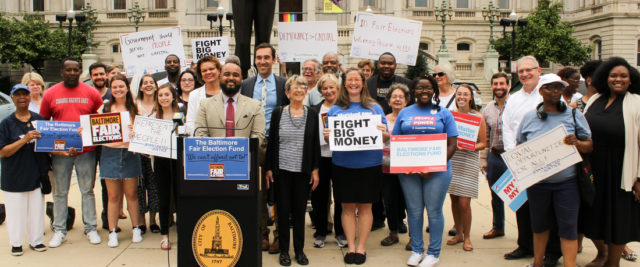Money in politics advocates across the country entered 2020 with significant momentum for reform. Legislative measures and ballot initiatives in Arizona, Oregon, New Hampshire, New York, Maine, Chicago and elsewhere, driven by BIPOC communities, signaled a meaningful shift toward a political future less encumbered by the influence of wealthy interests.
Unfortunately, as with so many issues, the COVID-19 pandemic forced several of these efforts to be temporarily sidelined as local, state and nonprofit leaders turned their focus to grappling with the impact of this public health crisis in their communities. Several legislative efforts were tabled for future deliberation, while signature gathering for ballot initiatives became nearly impossible to facilitate under new social distancing guidelines.
Yet, despite all of this, 2020 still saw the passage of multiple money in politics reforms. In April, the New York legislature passed an imperfect but meaningful statewide public financing program, which advocates will be able to build upon in the coming years. Organizers in Maryland passed a public financing system at the ballot in Baltimore County, the latest in a string of five local policy victories since 2014. Now, over half of the state’s residents live in a jurisdiction that has approved public financing, which builds stronger momentum for statewide reform in the coming years. And in Oregon, voters approved a constitutional amendment to allow the creation of contribution limits to political giving.

In the midst of such a challenging year, we are grateful to be able to celebrate policy wins like these—and others—and recognize the many ways that our grantees are building a stronger and more sustainable movement for reform.
As we have written about previously, in the face of the pandemic, our grantees led efforts to raise funds for impacted families, share resources, and advocate for housing and healthcare protections, all while maintaining a focus on advancing structural democracy reforms, such as public financing of political campaigns, ethics and disclosure laws, and increasing voter participation. In doing so, our partners are building community power and ensuring that our resources are going directly to where they are needed most.
Due to these efforts, local coalitions are well-positioned to continue building in 2021 and beyond. Several ballot initiative campaigns have pledged to resume in 2022 while others are considering their options to advance reforms even sooner.
In 2021, we are also pursuing a transformative scenario planning project that will engage key national and state actors to build alignment around ending corporate and oligarchic control of our democracy. With facilitation from Reos Partners, we will bring together a set of diverse stakeholders to create a framework for strategic conversations about how to understand the potential futures we face, and develop a shared understanding of the interventions we may use to correct the course of our democracy. Following the scenario planning phase of this project, we will take our learnings and advance a coordinated set of strategies to build a stronger democracy movement.
In the wake of what has been a tumultuous and politically scandalous year for our nation, our grantees are charting a path toward building a more inclusive democracy, and ensuring that elected officials are prioritizing the voices of communities most impacted—not just during a pandemic but all along the way.